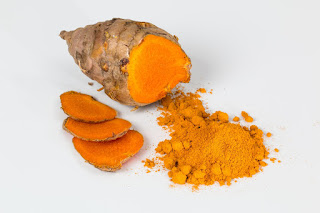Due to its numerous health advantages, traditional eastern medicine has long utilized turmeric. Turmeric's primary bioactive ingredient, curcumin, has potent anti-inflammatory and antioxidant qualities.
Though curcumin and turmeric are typically safe to eat, too much of it won’t be good. The possibility of renal damage from high dosages is one of the hazards. This is due to the fact that an excessive amount of curcumin might raise your body's levels of urine oxalate, which raises your risk of kidney stones.
What are the negative effects of turmeric?
Other possible dangers associated with excessive curcumin use include:
- Headaches, dizziness, diarrhea, upset stomach, and acid reflux are examples of mild adverse effects.
- Turmeric should be avoided if you have a bleeding condition because it thins the blood.
- Medication such as blood thinners, antidepressants, antibiotics, antihistamines, heart medicines, and chemotherapy treatments can all interact adversely with turmeric. It may also cause dangerously low blood sugar levels and conflict with diabetes treatments.
- Gallstones and acid reflux are two stomach issues that turmeric can make worse.
- If you are taking iron supplements, you should avoid taking turmeric as it restricts the absorption of iron.
- Turmeric is a spice that can be added to food, however it should not be taken as supplements by pregnant or nursing women. These supplements could lead to problems by inducing contractions in the uterus.
Before taking turmeric supplements, you should consult your doctor about any gastrointestinal issues, kidney stones, and general health concerns.
How much turmeric is safe to consume?
Turmeric extracts, which are primarily composed of curcumin, are used in studies demonstrating the health benefits of turmeric at doses greater than one gram daily. Since it's hard to get that much turmeric organically from a regular diet, supplements with a significantly higher curcumin content are frequently used in place of turmeric.
Generally speaking, taking a daily dose of curcumin supplements shouldn't exceed 12 grams, or roughly 1.4 milligrams per pound of body weight. Anything beyond that may result in negative side effects.
What are the potential health benefits of turmeric?
Curcumin has demonstrated encouraging results in a number of preclinical studies when it comes to treating heart disease, arthritis, Alzheimer's disease, gastrointestinal issues, and metabolic syndrome.
Turmeric has a number of important health advantages when taken in moderation.
- Strong anti-inflammatory qualities: Curcumin possesses anti-inflammatory qualities comparable to that of anti-inflammatory drugs, but without the negative side effects. It can aid in lowering long-term inflammation in the joints and tissues, hence reducing pain, stiffness, and swelling. Turmeric can be used to treat disorders including pancreatitis, inflammatory bowel disease, and rheumatoid arthritis because inflammation is frequently the origin of some chronic diseases.
- Pain relief: Curcumin helps lessen the discomfort brought on by inflammatory bowel disease and rheumatoid arthritis.
- Strong antioxidant characteristics: Turmeric shields the body from free radicals, which can harm healthy cells. In addition to slowing the aging process and increasing metabolism, it can lower the risk of heart disease, cancer, cataracts, glaucoma, and macular degeneration (age-related changes to the eyes).
- Immunity booster: The inherent antiseptic, antibacterial, antiviral, and antifungal qualities of turmeric aid in boosting immunity and warding off illness.
- Reduces cancer risk: Turmeric has been demonstrated in studies to be able to kill malignant cells and to disrupt the molecular basis of cancer growth, development, and dissemination. Particularly when it comes to treating and preventing digestive system malignancies like colorectal cancer, turmeric may be quite important. Additionally, it can aid in mitigating the impact of carcinogenic chemicals found in processed foods.
- Lowers heart disease risk: Curcumin's anti-inflammatory and antioxidant qualities may help avoid heart problems and other cardiovascular issues. Low-density lipoproteins, or bad cholesterol, are likewise decreased by curcumin, preventing atherosclerosis.
- Diabetes prevention: Curcumin postpones type 2 diabetes's start. When used with metformin, supplements containing turmeric may help regulate blood sugar levels in individuals with type 2 diabetes.
- Alzheimer’s disease prevention: Amyloid plaques, an accumulation of protein tangles in the brain associated with Alzheimer's disease, are removed by curcumin.
- Reduces Depression: Serotonin, dopamine, and other neurotransmitters are all increased in the brain by curcumin, which can benefit those who suffer from depressive symptoms.
- Aids digestion: By encouraging the gallbladder to create bile, turmeric improves the digestive system's effectiveness. Additionally, turmeric helps lessen bloating and help with enzymatic reacts, acid generation, and the best possible absorption of nutrients in the gut.
- Liver detox: Vital enzymes that aid in the breakdown and elimination of toxins from the liver can be produced in greater quantities when turmeric is used. By enhancing blood circulation, turmeric also supports healthy liver function.
- Improves bone health: Supplements containing curcumin can help maintain bone tissue, stop bone loss, and enhance joint function.
- Promotes good skin: Turmeric's anti-inflammatory, antibacterial, and antioxidant qualities may be useful for:
- Prevent acne
- Lighten dark circles
- Give a natural glow
- Heal wounds
- Reduce scars
- Reduce eczema and psoriasis
- Delay wrinkles
When consumed on its own, turmeric does not readily enter into the body. Therefore, to get the most health advantages from turmeric, it is best to take it alongside black pepper, which has a substance called piperine that increases the body's absorption of turmeric. Turmeric cooked in oil increases the amount of curcumin absorbed by the body.
Reference:
https://www.emedicinehealth.com/is_turmeric_bad_for_your_kidneys/article_em.htm

Comments
Post a Comment